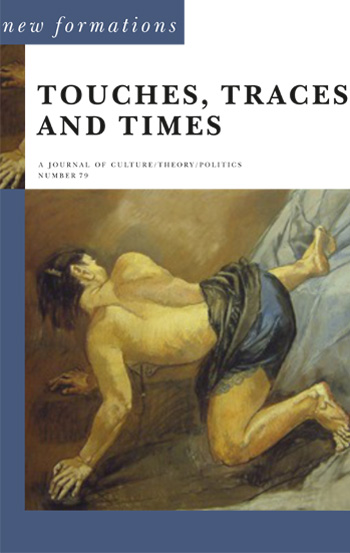
Collecting time: some reflections on the psychopolitics of belonging
New Formations - Print ISSN 0950-2378 - Online ISSN 1741-0789
Volume 2013 Number 79
Collecting time: some reflections on the psychopolitics of belonging
Lisa Baraitser
Abstract
Starting with the return to the aesthetic of the ‘peace camp’ that we have seen in the 2011 pro-democracy uprisings stretching from North Africa and the Middle East to the central squares of Madrid and Athens, this paper re-reads Luisa Passerini’s classic 1988 text, Autobiography of a Generation: Italy, 1968, as a way of understanding the intergenerational dynamics of protest. Passerini’s text reads the events of 1968 through collecting political testimony in the mid 1980s from those involved primarily in the occupation of the Palazzo Campana at the University of Turin, which she then juxtaposes with an account of her own psychoanalysis that she undertakes during the research period. Her psychoanalytic journey takes her to the core traumatic event of her childhood - the death of her mother at the age of six - which can only be worked through in relation to a working through of the events of 1968. I argue that through an engagement with the psychoanalytic tropes of remémoration and delayed action, we can see how the text both engages and reverses the classic feminist slogan, the personal is political, showing that it is through a capacity to attach to one’s own generation and to establish retroactively the lateral relations of ‘my time’, that the work of psychoanalysis can take place.
Drawing on Bracha Ettinger’s notion of the matrixial, the essay further proposes that this capacity for attachment to ‘my time’, is linked to what is not possible to separate from, lose, or abject, which Ettinger traces as an alternative substrata to psychic life, marked in the feminine as a form of positive difference. I read the matrixial in political rather than personal terms, linking the matrixial with a return to the aesthetics of communal living proposed by the ‘peace camp’. The essay concludes by tying together the double meaning of generation: generation (the collective time-frame of the political) with generation(the matrixial substrata of psychic life).
SORRY - you are not registered as being permitted online access to the full text of this article
You have the following options:
- If you are viewing this via an institution or academic library you can ask that your institution takes out a Subscription to this journal.
- If you already have a Personal Subscription please login below
Forgotten your username / password? Click here to locate
- Purchase an annual Personal Subscription
PRINT + DIGITAL personal subscription (£45 / year)
DIGITAL personal subscription (£30 / year)
A Personal Subscription provides immediate access not only to the single article you are seeking, but also to all past and future articles in this journal up to the expiry of your annual (calendar year) subscription. - Purchase immediate access to this single article (UK£7.00) - Buy article Coming Soon
To cite this article
Lisa Baraitser (2013) Collecting time: some reflections on the psychopolitics of belonging, New Formations, 2013(79)
